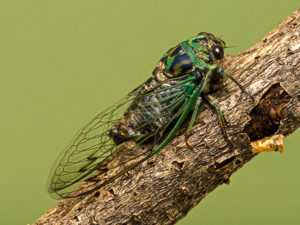Cicadas are not just a Midwest U.S. thing. They are common around the world, and we can vouch for their presence, in large numbers, in the south of France.
How do we know they are here?
Because these particular insects make a heck of a racket, and we have been hearing it day after day for a month.
Check the audio.
And if that is not clear enough, go to the wiki page, and scroll down to a series of recordings of cicadas from around the world.
Click on the one labeled “Cicadas in Greece” — which is not all that far from here and seems to have the sound most closely resembling what we are hearing in France.
It is almost a dull roar, when the cicadas get busy, and that generally happens when the temperature climbs past 75 degrees Fahrenheit.
It is not at all unusual to be near trees (the cicada’s preferred locale) and not hear a sound — and then every male bug in the tree (the noise is a call to female cicadas) seems to set off at once.
The cicadas are not speaking, per se. Instead, they are banging on a membrane that produces a sort of drumming/thrumming sound.
Cicadas, which range in size from one to two inches, are one of the loudest of insects and can cause damage to the human ear, if the bug is close enough to it.
The other odd part of the racket cicadas make is that if it gets cold enough … it disappears. Like someone has just turned the volume of the outside recording to zero as all the cicadas go quiet.
Cicadas are fairly famous bugs and common around the planet. (Several big trees are just outside our residence, and the cicadas are living in a large community there.)
They hatch in the bark of trees, drop to the ground and burrow several feet and hang out underground for years, sometimes, before returning to the surface and shedding their previous shell and become winged adults.
Cicadas are eaten in some parts of the world. Apparently, the females are thought to be meatier.
Cicadas pose little or no threat to humans, and generally do not do serious damage to the trees in which they reproduce.
It seems as if their purpose, from the perspective of homo sapiens, is to have a living, breathing avatar of summer just outside the doors of your house.


0 responses so far ↓
There are no comments yet...Kick things off by filling out the form below.
Leave a Comment